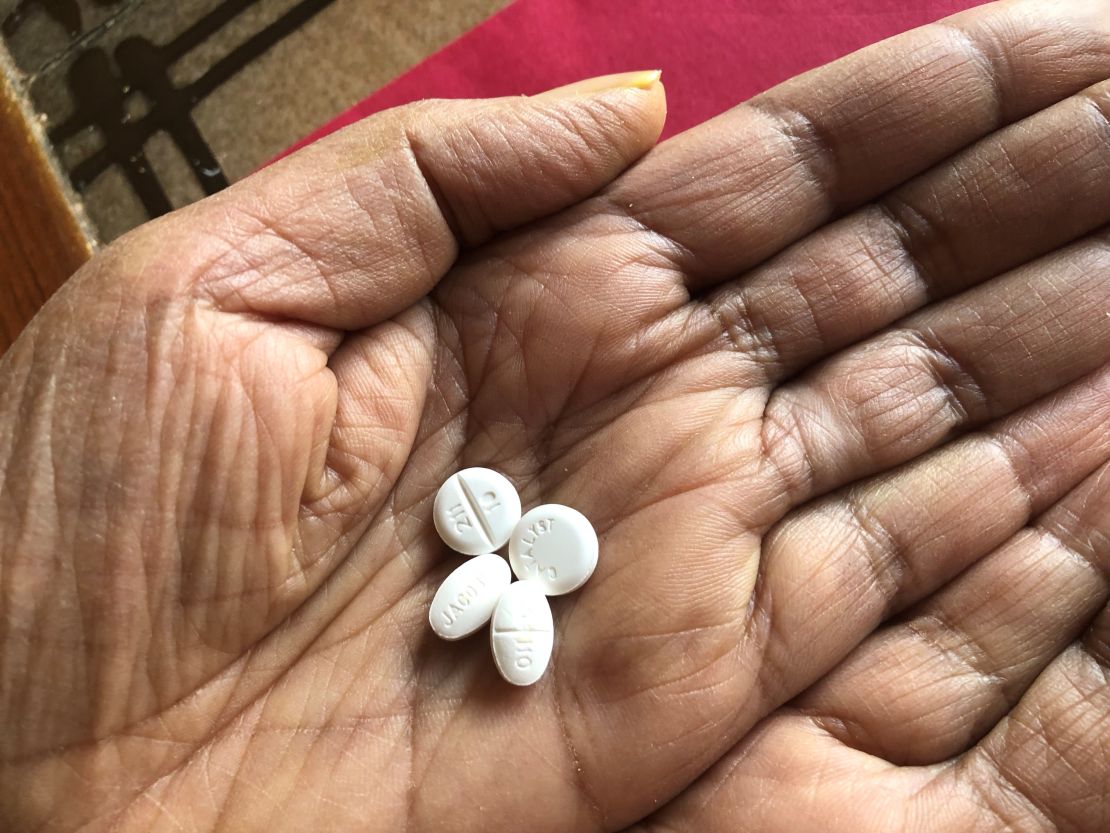Bhanu Patel couldn’t believe the news. The cost of the medication that allows her to move – the one that enabled her to walk stairs again – shot up to $375,000.
Fear gripped her: What would this mean for her independence? Would she become a financial burden on her family? How is this possible in the country that’s given her so much?
The past three years, she said, the medication had been completely free as part of a specialty program. Until recently, the drug was known as 3,4-DAP made by Jacobus Pharmaceutical. But late last year, Catalyst Pharmaceuticals wonFDA approval for a slightly modified version of the drug after two small clinical trials and announced an annual list price of $375,000 for the new drug, called Firdapse.
For Patel, the drug has been a game-changer. She was diagnosed in 2015 with a rare neuromuscular disease called Lambert-Eaton myasthenic syndrome, a condition known as LEMS that affects about 400 people in the United States, according to the National Organization for Rare Disorders.
The disease attacked her hip muscles and abdominal muscles first, then her back muscles she said. Just trying to stand up to walk was agonizing. She dragged herself across rooms and up and down stairs to get around her home. For two years, she wore three back braces on top of each other to allow her to stand.
The disease even attacked her tongue, making it difficult to eat. She lost a lot of weight, and her muscles atrophied. Every aspect of her life was impacted.
When she was introduced to the drug, her doctor told her it would make her feel more alert and allow her to regain basic functions. Her eyes opened wide when she first took the pills. “I said, ‘Wow, you’re right about that,’ ” Patel, 67, recalled. “You feel you want to live and have a life.
“Without this medication, you just can’t even move. It’s like your body is totally like a sweet potato.”
So imagine the predicament a skyrocketing price hike puts a patient like her, she said.
Fearful of burdening her family with exorbitant bills, Patel said, she’s begun rationing her meds – taking two pills a day, instead of four. She said she’s trying to stretch her three-month supply for as long as possible.
“The words that I can use is I can’t believe this is happening, to be honest,” she said.
Her son, Krishan Patel, said his mother has been rejected by Medicare forcoverage of the medication, raising concerns the family could get stuck with a massive bill. He said she is appealing for coverage as an exception. His mother has also applied with the Assistance Fund, a nonprofit organization that helps pay for patients’ co-pays. He said she has yet to hear back.
Between his sister and him, Krishan Patel said, they will do everything they can to help their mother. He’s already begun writing and calling lawmakers, AARP, the drugmaker and anyone else who will listen.
He said he’s not just speaking up for his mom, but for those less fortunate. “If we’re not shining a light on these things,” he said, “then really what the hell are we doing?”
“My mother’s livelihood is fundamentally at the hands of a small outfit with full capability to do whatever they want,” he said. “You’re leveraging human suffering to make money – and that is a heartbreaking idea.”

Bernie Sanders demands action
Sen. Bernie Sanders, who earlier this month demanded answers from Catalyst Pharmaceuticals about the drug’s $375,000 price, blasted the company for not responding, and he ripped Catalyst for endangering patients’ lives.
“Instead of answering my questions or lowering the price of this drug, they’ve hired a lobbying firm,” Sanders told CNN in a written statement Wednesday. “It is now clear that some patients are rationing their supply of Firdapse because they cannot afford to cover the outrageous cost of the drug, which they used to receive at no cost.
“If Catalyst does not immediately lower the price of the drug, I will ask FDA to allow pharmacies and manufacturers who were previously making this drug to be permitted to resume providing it, so that all patients can get the medication they need.”
CNN has contacted the US Food and Drug Administration for comment.
Two weeks ago, Sanders sent a blistering letter to Catalyst for its decision to raise the price of Firdapse – “and forcing production and distribution of the older, inexpensive version to cease.” Patients had been able to get the previous version of the drug for free through a compassionate use program through the FDA.
“Catalyst’s decision to set the annual list price at $375,000 is not only a blatant fleecing of American taxpayers, but is also an immoral exploitation of patients who need this medication,” said Sanders, who on Tuesday announced his latest Democratic presidential bid. “I am profoundly concerned that Catalyst’s actions will cause patients to suffer or die.”
Assuming his mother gets approved for the drug, Krishan Patel said Firdapse is listed as a Tier 4 medication on his mother’s Medicare with a 40% co-insurance. Even after rebates, he said, the family fears the possibility of spending more than $100,000 a year on the medication.
Catalyst maintains patients will be left with little to no cost, despite the fears within the LEMS community. CNN asked Catalyst about the possibility of patients getting stuck with a $100,000 tab as the Patel family has expressed.
“All Medicare patients are being directed to foundations that support the LEMS community. These foundations are reducing the co-pay for all patients to $0,” Catalyst spokesman David Schull said in an email. “No out-of-pocket costs for Medicare patients with this set-up.
“Your facts are wrong.”
Asked how Catalyst is informing patients about the co-pay program, Schull shot back: “Everyone is well informed. We do not have any additional information. I suggest you look for what will be a launch update when the company provides its year-financial resultsand corporate update in March.”
Krishan Patel said patients like his mother don’t have until March to wait when they need answers now. He blasted what he called Catalyst’s “inconceivable behavior to create anxiety in some of the most vulnerable patients with this disease.”
“That sounds like the most insane statement I’ve ever heard,” he said of Catalyst’s response. “At the end of the day, it’s like: ‘Really?’ ”

The Patels aren’t the only ones filled with anxiety over this issue.
Dr. S. Vincent Rajkumar, a hematologist oncologist with the Mayo Clinic, said he was giving a lecture to Mayo doctors on the rising costs of prescription drugs and what can be done about the issue. Unbeknownst to Rajkumar, one of the doctors brought along a patient who suffers with LEMS. The patient told him she’d been getting the drug from Jacobus for free since 2004 and that she had just been told she would have to pay $3,800 a month in co-pay.
That patient was Lore Wilkinson. She was outraged by the price hike she’s decided she’s not going to take the medicine – even if it means a rapid decline in her health. She’s already begun looking into getting a wheelchair “because my quality of life is going to tank.”
“I’m going to do without. I’m not going to be a party of enriching the pockets of this predatory pharmaceutical. Unconscionable!” she told CNN. “I don’t think it’s right to be a party to this highway robbery.”
“I would probably choke on it if I took it,” she said. “That’s because I think it’s such an outrage.”
Wilkinson said she was in the process of writing a “thank you” note to Jacobus for providing the medication for free for so many years. “You just wish every pharmaceutical was like theirs,” she said.
Jeane Arlowe leads a private Facebook group for the LEMS community. She said members of her group “have been reeling from the news and trying to wade through the insurance quagmire and Catalyst’s enrollment forms.” Beyond the price hike, Arlowe said, are other complaints.
“Most in my support group were on Jacobus DAP,” Arlowe said. “Many are reporting side effects since being on Firdapse such as racing heart, severe headache, dizziness, exacerbated weakness and gastrointestinal issues. A common complaint is that the Firdapse kicks in too fast and wears off too fast or doesn’t work at all.”
Many of these side effects are identified as possibilities in the drug’s packaging and product information.
A mother weeps

For Patel, the entire ordeal is overwhelming.
She grew up in South Africa during apartheid, often hiding from violence. Her father traveled the world to try to find a better place for his family to live – Europe, South Asia and South America. Her family eventually settled in Canada, before moving to the United States decades ago.
Get CNN Health's weekly newsletter
Sign up here to get The Results Are In with Dr. Sanjay Gupta every Tuesday from the CNN Health team.
She remembers being taught about America as a girl – a shining beacon of hope that stood for justice.
But her experience with this price hike has soured her. “This is the America we live in,” she said.
An America where one drug can break a person. “What does the future hold for my children – and the children of this country?”
She sobbed as she described not wanting to be a financial burden on her family.
“It’s just a lot of fear. I have to be honest,” she wept. “It just doesn’t feel good.”






















